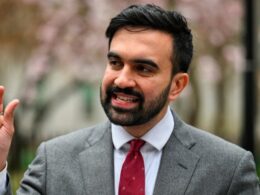Unlock the Editor’s Digest for free
Roula Khalaf, Editor of the FT, selects her favourite stories in this weekly newsletter.
International aid cuts by rich nations threaten to be deadlier than the Covid-19 pandemic in poorer regions such as Africa, the head of the Wellcome charitable foundation has warned.
The “abrupt change” in assistance policies by the US and other western countries would have a “huge health impact” in the most affected areas, said John-Arne Røttingen.
“The potential health impacts of these cuts are at the magnitude of the health impacts of the pandemic — and even higher, potentially, in mortality,” Røttingen said. “The abrupt cuts [in international aid] from the United States are challenging because they have such immediate effects.”
The remarks echo recent studies warning that slashed international funding for vaccination, anti-HIV/Aids efforts and other health campaigns could cause millions of deaths over the coming years.
US secretary of state Marco Rubio said in March that 83 per cent of US Agency for International Development programmes would be cancelled. The UK has announced a 40 per cut to its international aid budget as a share of national income.
The sudden funding crisis has driven home the need to reform global health provision and in particular the way donor countries often impose ways of working on recipient countries, Røttingen said. The southern African nation Malawi had to create 56 strategic plans for the health sector in part to fit different donor requirements, he said.
The funding shortfall cannot be made up by Wellcome, one of the world’s biggest biomedical charities, since its £37.6bn endowment and £1.5bn annual expenditure are geared to biomedical research rather than health delivery, Røttingen said. But the organisation wanted to play an important role in public health advocacy, he added.
Wellcome was organising five “regional dialogues” in Africa, Latin America, the Middle East, Europe and North America to propose reforms for public health, he said.
“We need to handle the urgent needs but we shouldn’t land prematurely on bigger reforms that do not take a longer term perspective on where we need to go,” said Røttingen, a Norwegian public health expert who has led Wellcome since last year.
Middle income countries such as South Africa and Nigeria are ready to take on more responsibility for operational spending, with local health workers replacing more expensive western staff, Røttingen said. In this way it should be possible to deliver HIV programmes for much less than the costs incurred by western donor agencies, he said.
International donors could then focus on funding infrastructure, innovation, research and development, though the world’s 40 or so poorest countries would still need aid to deliver basic healthcare, he added.
Røttingen raised concerns about other aspects of the Donald Trump administration’s attitude to science and health, besides aid cuts. One was the potential spread of misinformation by raising alarms based on lone scientific studies, while ignoring large amounts of research that came to opposite conclusions.
US health secretary Robert F Kennedy Jr warned last month at a meeting of the international vaccine alliance Gavi of the alleged dangers of the diphtheria, tetanus and pertussis jab. He did not mention the many studies backing its safety.
Røttingen’s message underscores fears among health experts that some governments are selectively presenting research for ideological reasons to support policies for which there is overwhelming contrary evidence — leading to a loss of trust in science.
“What we are concerned about is that there seems to be an increasing use of individual papers and researchers statements [to say] ‘See here, this is not safe, this is not effective’,” Røttingen said. “It’s almost using science as a tool in misinformation.”
Research infrastructure and scientific databases threatened by Trump’s cuts needed to be protected, Røttingen said. Wellcome and the Rockefeller Foundation have set up a coalition of climate science and health funders “to maintain these crucial infrastructures as global public goods”, he said. “All governments will need to come together to make sure that we have a resilient research and innovation ecosystem.”
Source link









